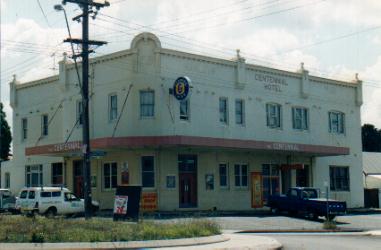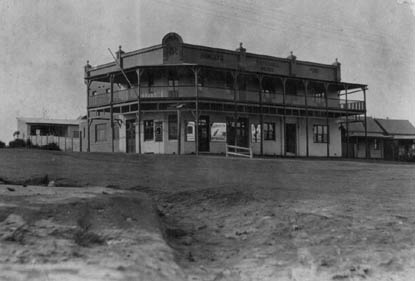
BY Mick Roberts
 |
| The Centennial Hotel today. |
'HAVE pub will travel' is an apt description of notorious New South Wales
publican William Hanley.
Hanley, an Irish immigrant,
established three pubs in the Heathcote District within a 6-year period, one of
which survives today as the Centennial Hotel at Helensburgh.
William Hanley and his brothers arrived in Hobart Tasmania from Ireland in 1854,
but after a short stint in the Cooma region the family drifted to the Georges
River, south of Sydney in the early 1880s. The Georges River wilderness was
being opened up with the South Coast railway works and was a scene of activity
and development.
Hanley and his wife Annie licensed a pub, known as the Woronora Hotel, at Como on February 3 1883 to cater for the hundreds of navies working on the Government railway. As the works proceeded further south business slackened at Hanley's pub and he opened another inn at Waterfall, where the navies camp had relocated, under the sign of the Heathcote Hotel in 1885.
 |
| Hanley's Centennial Hotel in 1905 |
This was where Hanley's
notoriety began. He was criticised by many a wowser
for taking advantage of the railway workers and providing a place for them to
'liquor up'. But Hanley's greatest claim to fame must be his connection with the
'salting' of a creek with fine alluvial gold in 1886.
Hundreds of prospectors arrived at Garie, in the Royal National Park, ready to
make their fortune. However, the find was a hoax and Hanley was said to be the
"controlling factor in opening up the Garie rush". Hanley's "very
dull hotel became a hive of business while the excitement lasted", it was
reported.
The navvies' departure from Waterfall, and talk of a coal mine opening further
south along the railway works at Helensburgh, coupled with the Irishman's
rumoured link with the 'salting', prompted Hanley and his brothers to move shop
once again.
They began building a 20-room
weatherboard inn on the present southwest corner of Hume Drive and Parkes Street
Helensburgh in 1886.
During construction work, brother, John Hanley - who was the builder - was
charged with selling grog without a license. He was said to have supplied liquor
to the workmen constructing his pub. The case, however, was dismissed.
The colourful and well-known hotelier's long battle to have his inn licensed
began soon after the sly-grog case. He was refused a license for the premises a
number of times before a conditional license was confirmed under the sign of the
Centennial Hotel on February 7 1888.
William Hanley settled into community life in Helensburgh and eventually became
a respected and influential resident. He died aged 64 from Influenza
in 1904 and was buried in the Helensburgh cemetery.
 |
| Hanley's pub that Reschs Brewery built in the 1920s |
Hanley's widow, Annie, who continued on as host after her husband's death, entered into a lease agreement with Reschs Brewery in 1914 that would lead to the construction of the present Centennial Hotel. The brewery secured a 26-year lease of the pub on the condition they replace the old inn with a new two-storey brick Hotel for the Hanley family.
The new Centennial was built at a cost of £5,233 with 18 rooms; timber balcony and iron roof and opened in May 1915. The opening coincided with the completion of the duplication of the South Coast railway.
The 1920s marked the beginning
of the end of the Hanley Family's close ties with the hotel industry in
Helensburgh. The original timber inn was demolished and pioneer publican Annie
Hanley died in 1923. Although this ended the Hanley's hands-on association with
the Helensburgh community, the family continued as owners of the building up
until its sale to Tooths Brewery for £5,500 in 1936.
Today the Hanley family name is still visible on the façade of the pub and is a
reminder of the pioneering role they played in the region's hospitality
industry.
Today the Centennial Hotel is a popular watering hole in the small Helensburgh community and, although situated on the border of two of NSW's largest cities, is typical of many country pubs. The Centennial is well worth the drive and serves great counter lunches and, of course, plenty of cold beer.
ooOOoo
Mick Roberts is a journalist and hotel historian. He has had two books, The Little House on the Hill and The Local, published on the liquor industry and, besides other local history publications, is presently working on a comprehensive history of the liquor industry and hotels in the Illawarra region of NSW. His regular history feature, Looking Back, can be read in the Northern Leader newspaper distributed throughout the northern suburbs of Wollongong NSW. These feature articles also appear at his Looking Back website www.slackycreek.fcpages.com
Mick is always on the lookout for pub yarns, stories, information and old photos
and can be contacted by email at slackyflat@hotmail.com or
PO BOX 5148 Wollongong 2500.
Take a break from drinking like the author of this article did - Read why and how in his book Between Drinks: Escape the Routine, Take Control and Join the Clear Thinkers